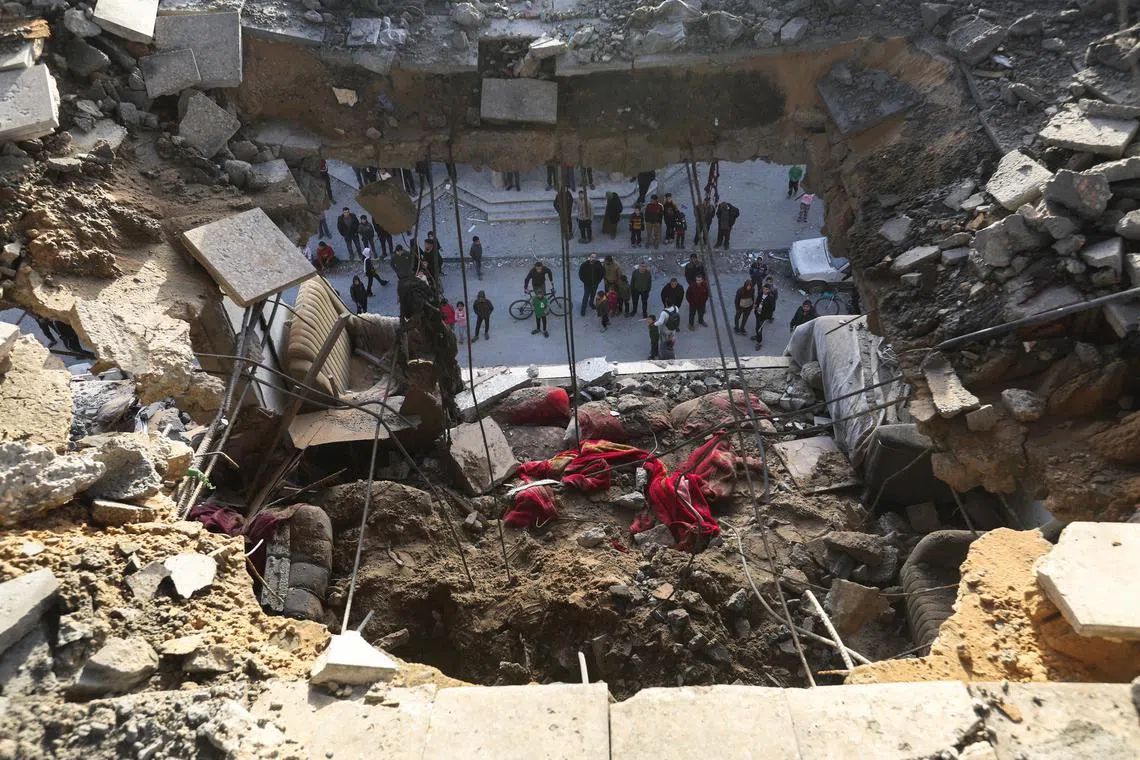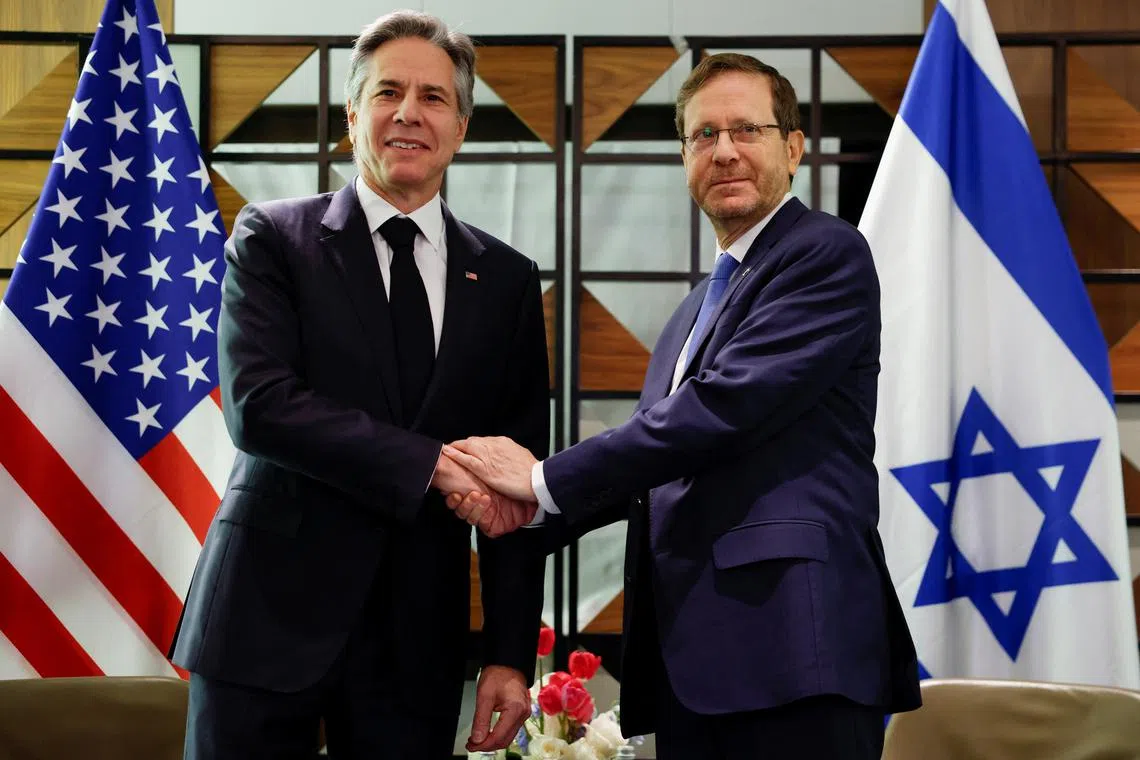Israel, shifting war tempo, tailors its messages for home and abroad
Sign up now: Get ST's newsletters delivered to your inbox

Israel’s differing rhetoric is an effort to placate the international audience to pursue long-term goals, analysts say.
PHOTO: REUTERS
JERUSALEM – With a vast chasm between how Israelis see the war in the Gaza Strip and how much of the world does, Israel’s leaders have taken to adopting different rhetoric when addressing the two audiences about how its military campaign against Hamas will be conducted over the year ahead.
Israeli officials have begun to tell international news media that its forces are shifting to a less intense phase of operations
But after those comments were published on Jan 8, Israeli leaders sought to reassure the Israeli public that they remained committed to a long-term war in Gaza to destroy Hamas, even if the military tactics are shifting.
The messages are not incompatible, analysts say: The pace of a war can ebb without the conflict ending.
But they say the differing rhetoric reflects the Israeli government’s effort to placate an international audience in the short term, in order to pursue its goals over the long term.
At home, the government must answer to a population traumatised by Hamas’ Oct 7 attack on Israel
But to do that, Israel must retain some level of international legitimacy, especially if it wants to sustain the support of its primary backer, the United States.
Top US diplomat Antony Blinken visited Israel on Jan 9
The juggling act will become even harder on Jan 11, when the International Court of Justice will hear allegations, levelled by South Africa, that Israel is committing genocide against Palestinians
The hearing could lead the court to order Israel to suspend its campaign, a largely symbolic gesture that Israel might ignore, but only at further cost to its reputation.
“With all these put together, Israel wants to put on an image of, ‘OK, we’ve taken the criticism, we’ve integrated and incorporated the remarks,’” Mr Alon Pinkas, Israel’s former consul-general in New York and a political commentator, said in an interview.
By contrast, Mr Pinkas said, the Israeli mainstream does not want to hear that the war is winding down while Hamas remains active in much of Gaza.
Israelis, he said, “understand that very little has been achieved, if the idea was to eliminate or eradicate or obliterate or annihilate or topple Hamas”.
The rhetorical double act may have been clearest on Jan 8, when the Israeli military spokesperson, Rear Admiral Daniel Hagari, said in an interview with The New York Times that the war had entered a new phase, with Israel drawing down its troops, focusing on southern regions of Gaza and decreasing the number of air strikes.
Earlier that day, Defence Minister Yoav Gallant told The Wall Street Journal that Israel would soon transition from “intense manoeuvring” towards “different types of special operations”.
But in their domestic appearances, the men had a different focus.
In his daily Hebrew-language press briefing on the night of Jan 8, Rear-Adm Hagari responded to a question about his interview with the Times by saying that the goal of dismantling Hamas remained in place, and that the “semantics” of whether the war had entered a new phase “doesn’t serve the Israeli public”.
And separately, Israeli news media reported that Mr Gallant had told fellow right-wing lawmakers in a closed-door meeting that the war would continue “for many more months”, and for that to happen, Israel needed a “margin for international manoeuvre”. Mr Gallant’s office confirmed the remarks.
The comments to international news media also appeared to be an effort to address calls from the US to ease the fighting, and they came hours before Mr Blinken landed in Tel Aviv for discussions about the war.
The Biden administration has been under pressure to scale back its support for Israel, and Mr Blinken has called on Israel to use more precision in its strikes on Gaza.

US Secretary of State Antony Blinken (left) meeting Israeli President Isaac Herzog in Tel Aviv on Jan 9.
PHOTO: REUTERS
Before Mr Blinken’s visit, US officials said that they had been privately reassured by their Israeli counterparts that this transition would be completed by the end of January.
Some 50,000 Israeli soldiers were in Gaza at the height of the campaign in December, and more than half of them have left, the US officials said.
While a majority of Israelis want to see Hamas destroyed following its attack, which killed an estimated 1,200 people, international public opinion has been turning against Israel.
In the US, there is growing criticism of Mr Biden’s stance on the war: Protesters interrupted a speech by the president on Jan 8 in Charleston, South Carolina, urging him to stop backing Israel’s military campaign.
“Call for a ceasefire in Gaza,” one shouted.
Israel’s offensive has killed more than 23,000 Palestinians since the war began in October, according to the Gaza Health Ministry.
The scale of that toll – roughly 1 in 100 people in Gaza have been killed – has given fuel to the allegations of genocide that will be discussed this week in The Hague.
Israel has strongly denied the accusations, but those making them have pointed to inflammatory statements from Israeli government ministers and lawmakers.
The petition to the court lists scores of statements it says imply genocidal intent. It also argues that Israel is seeking to harm Palestinians by limiting delivery of aid to the territory.
Against that backdrop, the Israeli government has redoubled its efforts this week to make a different impression.
In addition to the comments from Rear-Adm Hagari and Mr Gallant, the government has scheduled a press day at the Gaza border on Jan 10 where, it said, it would show journalists how Israel was working to allow aid into the territory.
The attorney-general, Mr Gali Baharav-Miara, issued a statement on the night of Jan 9 in English, pledging that the government and its security forces were “all committed to act in accordance with international law, including the law of armed conflict”.
It said that “any statement calling, inter alia, for intentional harm to civilians, contradicts the policy of the State of Israel and may amount to a criminal offence, including the offence of incitement”.
The government, nevertheless, is still far from winding down the war.
Even as they pledged to scale back their operations in northern Gaza, Israeli officials said the fighting would continue at full intensity in the south, where most of the population of Gaza has fled, and where the Hamas leadership is believed to be hiding. NYTIMES


